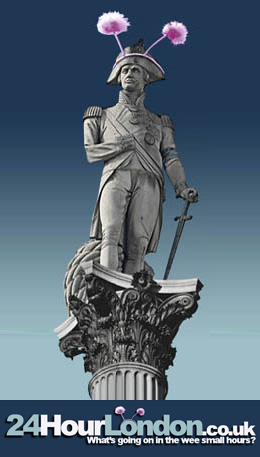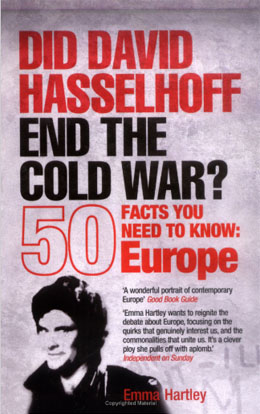A song called Wreckers ("we're the Moonfleet crew") by The Changing Room arrived through the post: hence the otherwise gratuitous picture of Ray Winstone looking a bit moody in a doublet in the recent mini-series of Moonfleet. Although the song was provoking, with its Cornish pirate-style vocals by John Cleave of Fisherman's Friends, back in December I was living in a house-cum-building-site and, with the best will in the world, finding it hard to concentrate on anything apart from wild speculation about what kind of animals – cats? birds? badgers? – the builders would accidentally trap in the house next. Seriously.
However, the song – which is on The Changing Room's first album, Behind the Lace (just out) – preyed on my mind, with its wholesale retelling of the wrecking myth ("We plan by day, we move by night, Beware the lure of the wreckers' light") . This is because about 20 years ago I had a newspaper job in Cornwall where I spent time mulling over what the editor called "westcountry-ness". I was a feature of the Truro, then Bodmin offices of the Western Morning News (WMN) from 1995 until 1997 and our boss, Barrie Williams, would come down from Plymouth from time to time to tell us about the direction the paper was supposed to be taking.
He'd done some market research, much to the hysterical amusement of my older colleagues, and believed that the WMN's fastest-growing group of readers were recent arrivals to Devon and Cornwall from elsewhere in the UK, usually cities. They were most often attracted there not by the quality of life for - then as now - unless you're wealthy, the cost of buying housing in Cornwall is ridiculous. No. Many of them, Barrie thought, had been attracted by the idea of the place: something a bit wild, full of myths and legends, fluffy little bits of celtic fringe, mystical bollocks about piskies, pirates, wreckers, smugglers, Tintagel, the beast of Bodmin and the witchcraft museum in Boscastle. The readers, it seemed, really liked the part of Cornwall that was essentially fictional.
My gnarly male colleagues were uniformly unimpressed by this theory: Robert Jobson, David Green, Colin Gregory and Michael Taylor (whose name is always pronounced very loudly and in a pronounced Northern Irish accent in my head, on account of that being how he spoke) thought it was ridiculous. Between them they had about 120 years experience in Cornish journalism, they knew where the bodies were buried, and they thought Barrie would probably blow over.
However, I was young and keen, and Barrie had just given me a job. So I set about doing as I was bidden – looking for the kind of stories the editor had mentioned – and hit the trail of Daphne Du Maurier quite hard. Other areas potentially of interest, I decided, included Poldark, a New Age conference in Polperro where David Icke sometimes spoke and Mayday in Padstow, which I explored in addition to the usual round of court hearings and council meetings.
During the course of these endeavours I soon met Daphne Du Maurier's son, Kits Browning, who lived overlooking the chain-link ferry in Fowey. Browning was a charming old gent - probably not that old, I realise now, but I was very young - and going to visit him was such a pleasure for a cub reporter in bad shoes (they always seemed to be soaked through), that I went as much as possible. His place was warm, dry and civilised, I always got a cup of tea and he was a good talker. I suppose I was slightly starry-eyed about his famous mother.
So, perhaps inevitably, when I heard Wreckers the other week I thought of Jamaica Inn, Du Maurier's novel that did its bit to cement the reputation of the Cornish as semi-feral pirates and thieves who would cut your throat for a barrel of something that had washed up on a beach.
I'd once tried to write something about wreckers as a reporter, you see. In my imagination wreckers were men and women who would actively lure ships to their doom on rocky shores by moving lights around at night-time to misrepresent where the land was – but the whole idea had been thoroughly squashed, in the sense that there was no truth in it, by someone who knew whereof they spoke, making it impossible to go any further with a good conscience. The more interesting question immediately became how these stories got started if there was nothing in them?
So, when The Changing Room's single arrived, I thought I'd ask Kits whether his mum had ever discussed with him the aspect of her work that involved mythologising Cornwall? His phone number was the same the same 20 years on – yay! – but slightly disappointingly his response was: "No, sorry. Mum never really discussed that kind of thing with me. I was probably too young." A brief catch-up convinced me that, in search of something interesting and fact-based to say about wreckers, I should try the academic route.
Professor Philip Payton of Exeter University wrote a rather fab coffee table book about the history of Cornwall.
In fact, there it is on my coffee table, wearing a Changing Room beermat.
I emailed Payton, who had once sent me that book in the post, while all the time using the web to find out things about wreckers that were basically unavailable 20 years ago, on account of the internet being very much in its infancy.
The Shipping News, a wonderful Pulitzer prize-winning novel by E. Annie Proulx, was mainly set in Newfoundland, and Proulx's wreckers, from memory, were rumoured to be cannibals. Intriguingly, the entry about wreckers in Wikipedia is nearly all about North America – so the legends seem to have have currency wherever there are rocky shores.
Professor Payton, however, is an expert on the westcountry. He replied to my email, saying: "All that false lights and deliberate wrecking is a myth, really a result of the romantic re-invention of Cornwall by late Victorian and Edwardian novelists and writers. There is an excellent and very comprehensive book by Cathryn Pearce called 'Cornish Wrecking 1700-1860: Reality and Popular Myth' which deals with this. It'll be in the British library."
But was I right to think that "false lights" would never have worked? I understand there was an episode of the BBC2 series Coast that dealt with this? Surely any helmsman would just steer away from any kind of lights? "'False lights' would only work when a ship was in close in shore, due to the low visibility of lanterns before electricity," he said.
"Such ships would be making for harbour or running along the coast, in which case they would have a good idea of what lights to expect and to look out for. But if, by mischance, a ship was run close on shore on an unfamiliar coast then 'false lights' would be superfluous, as the ship would probably be wrecked anyway. The main reason why 'false lights' were unnecessary, though, was because wrecks were so commonplace along the Cornish coast."
No luring required.
Cathryn Pearce's book was indeed in the British Library and I spent a happy half a day splashing around in the warm Gulf Stream of Cornish history – although Kent also seems to have its share of wrecking stories.
Pearce is very thorough. She points out that "wrecking" can refer to a lot of different things, including "harvesting" goods that the sea threw ashore and "salvage", in which locals tried to save the lives of shipwrecked sailors in the days before the RNLI. This was in addition to the "mythic wreckers" and "plunderers" who were rumoured to be prepared to attack a boat for its cargo but for whom there is very little historical evidence. In fact only one person was ever hanged in Cornwall for the crime of "wrecking", his name was William Pearce (maybe some relation?) and he was 82 years old when he died in 1767 near Launceston. His alleged crime – for he claimed he was innocent to the last - was to have helped himself to small amount of cotton from a beached wreck. His great age meant he was slow enough to catch, I guess.
The bigger story that unfolds in Cathryn Pearce's extremely readable book is about a fight of epic proportions over the legal right to shipwrecked property in, what was to all intents and purposes, a free-for-all and propaganda counted for a great deal. Eighteenth-century Cornwall was a part of the world where laws written in London were often confused with local custom and habit. Cornish landowners would claim a portion of any cargo that washed ashore and the locals acquiesced. Except when they didn't. And there was the rub.
The way Pearce tells it, the stories of the feral, murderous, immoral Cornish men and women that gained traction in popular fiction demonised ordinary people because it suited a coalition of landowners, shipowners, investors and insurance companies who were – unusally for them – the financial losers of the situation.
It also suited fiction-writers, fiction-readers and eventually even the Cornish themselves. Pearce writes: “As other marginalised groups have done, [the Cornish] have attempted to ‘own’ the myths through a retelling of the stories in their own way, whether in the yarns told to willing listeners, or through more permanent means of literature, theatre and film.
“Yet defensiveness is also apparent…
wrecking is a sensitive subject. At the root of Cornish defensiveness is the
accusation that they lured ships ashore using false lights, not that they were
involved in the plunder of shipwrecks."
It's not surprising. There's a huge moral difference between picking things up off the beach and murdering a ship's crew. Aside from anything else, Methodism was pretty big in Cornwall.
I like a good pirate story – and The Changing Room are from Looe, so I'm sure they've heard a few. But give me the complicated truth any day.
Since I can't find a video of The Changing Room to embed, here's Show of Hands playing Tall Ships Medley.
* If you'd like to receive posts from this blog directly into your Facebook newsfeed, you could *like* its Facebook page and then use the drop-down menu to indicate that it's one of your "interests". This will enhance the possibility that you'll get them. You could also follow me on Twitter @emma1hartley





